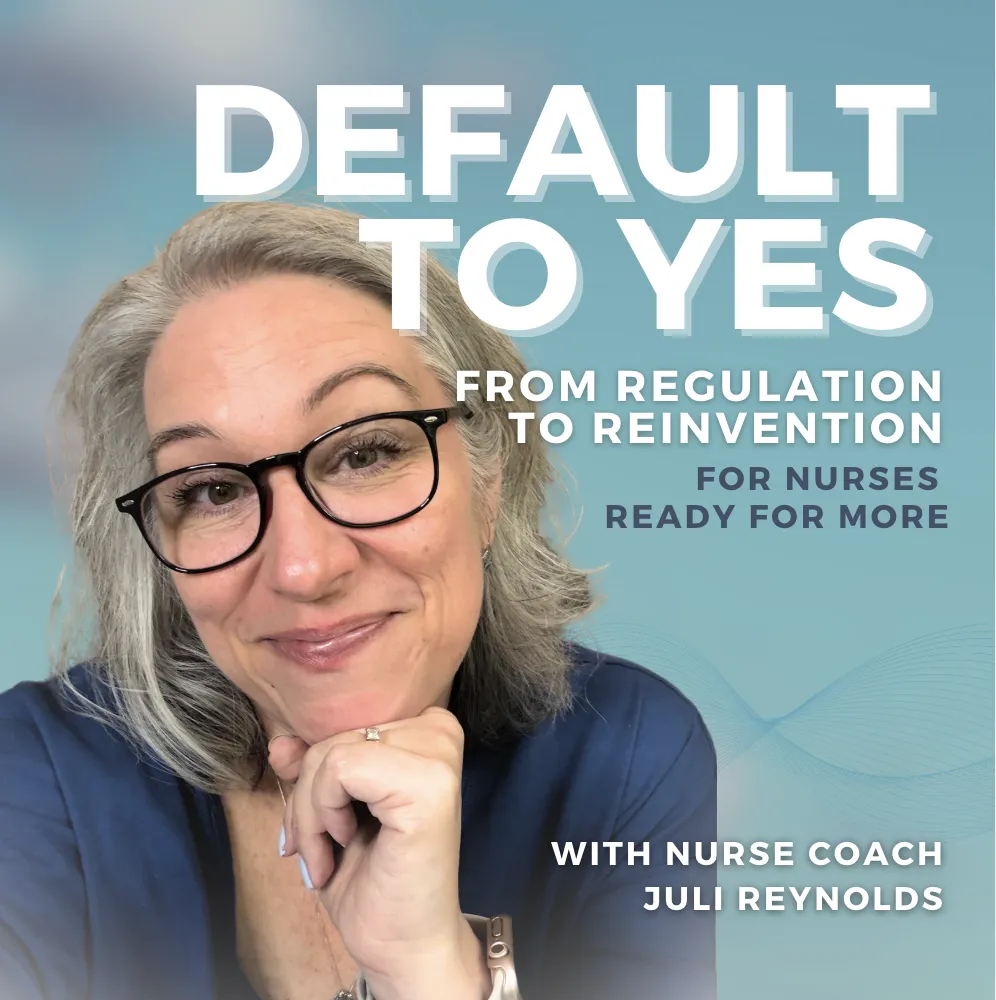Welcome to Default to YES! Podcast
weekly coaching session for Nurses ready for more.
More clarity. More confidence. More capacity.
More freedom to move from regulation to reinvention—without losing yourself in the process.
SUBSCRIBE & NEVER MISS AN EPISODE!
OR GET ON THE LIST - I'll send you every episode along with all the bonus material!!

If you’re ready to move beyond surviving and start
saying YES—to your calling, to your health, and to your extraordinary self— If you are ready to train your brain
to cooperate with you - so you can get your goals and live a life that you love - this is for you!!
I'm Juli Reynolds, Board Certified Nurse Coach and Clinically Certified Aromatherapist Juli Reynolds, this podcast blends neuroscience, holistic health, and soul-centered coaching for leaders and high performers rise above burnout, navigate transitions, and live the life they were created for.
Each episode is approximately 20 minutes of:
Science-backed strategies for brain health, resilience, and well-being
Holistic practices like aromatherapy, breathwork, and lifestyle medicine
Stories & coaching questions that spark courage, confidence, and clarity in your daily life*

Blog
Default to Yes! Your Extraordinary Self

Are Outdated Rules Holding You Back? Here’s the Truth About Growth
What if the very rules you’ve been following are the ones keeping you stuck?
In healthcare — and in life — we often cling to dogma. “That’s just the way it is.” But dogma is comfortable, not necessarily correct. Data, on the other hand, shows us the real story. And the gap between the two can be the difference between burnout and resilience, between surviving and thriving.
Fever vs. Growth Signals
Years ago, when I worked as a telephone advisory nurse, my nights were filled with calls from panicked moms.
It almost always started the same way:
“My baby has a fever — what do I do?”
The dogma most of us grew up with says fever is the problem. Treat it immediately. Bring it down. Get rid of it. Because if the fever is gone, then the danger must be gone too.
But the data told us something different.
I would reassure those exhausted parents:
“Don’t treat the fever unless it’s above 102, or unless it’s keeping your child from drinking and staying hydrated.”
Because fever itself isn’t the enemy. Fever is the alarm. It’s the body’s way of fighting infection, of mobilizing the immune system, of healing. The real danger isn’t the fever — it’s ignoring what the fever is trying to tell us.
If you shut the alarm off without checking the fire, you miss the very thing that needs attention.
🎙 Translation to Life and Growth
And that’s true for us too.
In our own lives, we get “fevers” all the time: stress, exhaustion, boredom, irritability, anxiety. Dogma tells us to shut them down. Push through. Distract yourself. Medicate. Ignore it.
But data — and wisdom — tells us those signals matter. They’re not the problem to silence. They’re the guide to what’s really happening underneath.
The goal isn’t to numb the discomfort — it’s to listen to it, to let it guide us toward healing.
The Prevention Lesson
In an time when instant gratification is our driver, we've begun to overlook—even dismiss—the invaluable shield of prevention. Asking "Why bother if you feel fine?" seems a reasonable position to take, until we consider cutting - edge science, like mRNA vaccines. These medical miracles are a testament to the power of proactivity—a wakeup call that prevention is not just better than cure, it's a cornerstone of our well-being in a fast-paced world.
The balance of good habits and good science saves lives, reduces suffering, and protects communities.
In personal growth, prevention looks like daily habits of rest, reflection, and resilience. It’s building strength before crisis hits, instead of waiting until something breaks.
The Sleep Myth
Dogma tells us: “I can get by on 5 hours.” Data tells us less than 7 hours of sleep harms health, energy, and cognition. People who think they’re fine on little sleep are the worst at seeing their decline.
This isn’t just about sleep — it’s about the myths we believe. Just because you don’t feel symptoms now doesn’t mean damage isn’t being done.
Are you thinking right now of that friend of relative who brags about not needing to sleep? It would be nice if that were true more often, but truth is - we have data that says how rare that is. We believe the myth to our detriment, as it is with most myths.
Translating to Personal Growth
Dogma in life sounds like:
“You can’t change who you are.”
“Success means working harder than everyone else.”
“Midlife is a crisis.”
But data looks like:
Neuroplasticity — your brain can change at any age.
Habit science — small wins stack into momentum.
Resilience research — purpose and connection predict longevity and well-being.
And then there’s your personal data: tracking your sleep, mood, and energy. Paying attention to what fuels you versus what drains you. That’s how you shift from assumption to awareness.
Why We Default to Dogma
Dogma feels safe. It’s socially reinforced. In healthcare, it feels risky to challenge expert consensus. In life, it feels risky to challenge cultural norms or family expectations. We don't like it when people roll their eyes at us. But, maybe just let them roll their eyes - and tell them that they are going to get stuck that way!
Dogma without data leads to burnout, disappointment, and disconnection.
The Way Forward
Science proves change is possible. Your brain rewires when you practice new patterns. Small wins trigger dopamine that builds momentum. Purpose, connection, and resilience aren’t abstract ideas — they’re measurable drivers of well-being.
The question is: are you living by outdated rules… or by data that sets you free?
Closing Inspiration
You don’t have to wait for symptoms to make a change.
You can choose prevention.
You can choose resilience.
You can Default to Yes — on the life you were created for.
Episode Resources and Freebies:
COMPANY
CUSTOMER CARE
NEWS
LEGAL

© Copyright 2026. Reimagine Wellness. All Rights Reserved.









